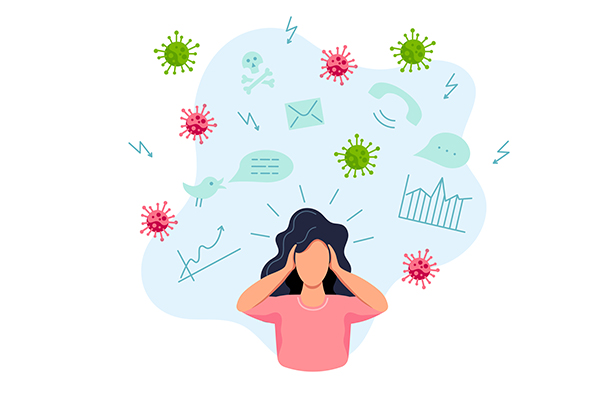What is anxiety?
According to the International (statistical) Classification of Diseases (ICD-11) a generalised anxiety disorder exists when for most of the time during several months you are expecting something bad or worry about everyday events in your life and it causes muscle tension, restlessness, heart-rate increase, rapid shallow breathing, higher blood-pressure, sweating, increased body temperature, feeling nervous, less concentration, irritability, sleep disturbance that result in distress and problems with life and aren’t due to being ill or taking a drug.
According to the Diagnostic and Statistical Manual of Mental Disorders, 5th Edition (DSM5) Generalised Anxiety Disorder (GAD) must have excess anxiety and worry about something bad that may happen in one’s life most of the time for six months or more, be hard to control, and causes (any in children or at least three for adults of) restlessness, fatigue, less concentration, irritability, muscle tension and sleep disturbance that significantly lowers functional living and is not caused by a substance, medical condition, or other mental condition (Kupfer, 2015).
Is Anxiety a Mental Health Disorder?
A common source of confusion is the way words are used to mean different things in psychology. Anxiety is a good example. Anxiety is not a disorder but Generalised Anxiety Disorder (GAD) is (Rowa & Antony, 2008). It is described as a maladaptation to stress where the stress goes from being caused externally to internally, by a person’s thinking process. There is still an old biological imbalance theory that is referenced but modern neuroscience explains the biological aspect differently. Like it’s cousin depression, which is equally confusing, anxiety, when it is constant and disrupting one’s life, causes a powerful change in a person’s body and brain. A better way to understand anxiety is as a poor stress response.
The biology of the response to stress is the key to understanding anxiety. As Dr Robert Saposlky explains in his book “Why Zebras Don’t Get Ulcers,” from decades of research we know the brain regulates it’s hormones throughout the body with a complex feedback system created across evolutionary time. The stress response system is designed to ensure human survival and it worked well for thousands of years but it has not been adapted to our modern world which is only a few hundred years old. We are all then not biologically adapted to our environment and so our stress response is out of balance (Saposlky, 1994).
How to Treat Anxiety
Traditional treatments for anxiety include a variety of drugs to cause relaxation but many of these can create dependency and abuse. Other methods include relaxation and psychotherapy which use cognitive and behavioural techniques from many different models. Finding the right intervention can be a challenge but neurocognitive training incorporates the features from all the mainstream psychotherapies to allow a comprehensive approach. We call it the Neurocog™ System.
The Neurocog™ System helps people learn skills that enable them to regulate their stress response better by seeing the direct relationship between biology and mental information. When Ideas and thoughts are misinterpreted as threats, triggering a stress response over and over a person is in a consistent state of anxiety. Neurocognitive training helps retrain and regulate that stress response to not be triggered as frequently and over time enables a person to gain more and more control. When balance and control are established a person can function better in their life, free from the crippling effects of constant anxiety.
At our clinical office the staff of Neurocog™ are here to help you if you feel you may have anxiety or any other issue in the way you are feeling and thinking. Contact us directly at 02 82249670 or go to our website www.neurocogsystem.com to find out more.
Kupfer, D. J. (2015). Anxiety and DSM-5. Dialogues in clinical neuroscience, 17(3), 245.
Rowa, K., & Antony, M. M. (2008). Generalized anxiety disorder.
Sapolsky, Robert M. Why Zebras Don’t Get Ulcers: A Guide to Stress, Stress Related Diseases, and Coping. New York: W.H. Freeman, 1994.


